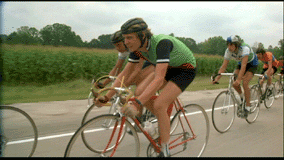|
Newest Reviews:
New Movies -
The Tunnel
V/H/S
The Tall Man
Mama Africa
Detention
Brake
Ted
Tomboy
Brownian Movement
Last Ride
[Rec]³: Genesis
Hara-Kiri: Death of a Samurai
Indie Game: The Movie
Abraham Lincoln: Vampire Hunter
Old Movies -
Touki Bouki: The Journey of the Hyena
Drums Along the Mohawk
The Chase
The Heiress
Show
People
The Strange Affair of Uncle Harry
Pitfall
Driftwood
Miracle Mile
The Great Flamarion
Dark Habits
Archives -
Recap: 2000,
2001, 2002,
2003, 2004
, 2005, 2006,
2007 , 2008
, 2009 ,
2010 , 2011 ,
2012
All reviews alphabetically
All reviews by star rating
All reviews by release year
Masterpieces
Screening Log
Links
FAQ
E-mail me
HOME
| |
Breaking Away (Peter Yates) 1979
 The sports film is definitely one of the most cliché ridden of all film genres.
Still, every so often one comes along that is disarming enough to make audiences
willingly lap up its lack of creativity. Released in 1979 to great critical
acclaim, and, eventually, a multitude of Oscar nominations, Peter Yates’ Breaking
Away is as mainstream as sports films come. Set in Bloomington, Indiana,
this movie examines an aimless group of recent high-school graduates as they try
to find themselves while fighting with the spoiled college kids that they feel
invade their town. Without much in the way of responsibility (they don’t work
or study) or personality (one scrappy character’s most defining characteristic
is his height), the kids gradually come of age in the year after high school.
Dave (Dennis Christopher), the protagonist of the story is obsessed with bicycle
racing, and before long, the two factions square off in a bicycle race. We’re
meant to root for the townsfolk because they’re underdogs, and boo the college
students because they’re rich.
The sports film is definitely one of the most cliché ridden of all film genres.
Still, every so often one comes along that is disarming enough to make audiences
willingly lap up its lack of creativity. Released in 1979 to great critical
acclaim, and, eventually, a multitude of Oscar nominations, Peter Yates’ Breaking
Away is as mainstream as sports films come. Set in Bloomington, Indiana,
this movie examines an aimless group of recent high-school graduates as they try
to find themselves while fighting with the spoiled college kids that they feel
invade their town. Without much in the way of responsibility (they don’t work
or study) or personality (one scrappy character’s most defining characteristic
is his height), the kids gradually come of age in the year after high school.
Dave (Dennis Christopher), the protagonist of the story is obsessed with bicycle
racing, and before long, the two factions square off in a bicycle race. We’re
meant to root for the townsfolk because they’re underdogs, and boo the college
students because they’re rich.
 This timeworn material probably should work, but it doesn’t
really since, most of the film’s angst and conflict seems calculated. The
scenes that contain little or no dialogue, especially those that show actual
bicycle racing, are those that work the best, since whenever the characters
start talking, they make bold proclamations that are obviously meant to have
implications beyond their lives. I suppose this sort of schematic filmmaking
makes these small town folk easier to relate to for many people, but for me, it
was too obvious and too synthetic to be convincing. As a result, the uplift that
is predictably delivered feels more like manifest destiny than a pleasant
surprise. An even greater problem arises when a movie this manipulative relies
on its modesty to be involving, and Breaking
Away’s attempts at modesty nearly always fall flat, despite the best
attempts of the actors involved. The saving graces of Breaking Away are the performances, which don’t seem to take this
fluff too seriously, and the film’s tone, which often skews toward the comic.
The only way that one can take this film’s inflated sense of nostalgia and
Americana is with a grain of salt, so the gentle mocking that it receives seems
fitting. The inflated sense of drama and burlesque caricatures of concerned
parents that Paul Dooley and Barbara Barrie bring to their roles as Dave’s
parents suggests that they seem to be most in on the joke, but many of the
movie’s winsome moments seem over-the-top in a way that suggests our
eye-rolling is the appropriate response.
This timeworn material probably should work, but it doesn’t
really since, most of the film’s angst and conflict seems calculated. The
scenes that contain little or no dialogue, especially those that show actual
bicycle racing, are those that work the best, since whenever the characters
start talking, they make bold proclamations that are obviously meant to have
implications beyond their lives. I suppose this sort of schematic filmmaking
makes these small town folk easier to relate to for many people, but for me, it
was too obvious and too synthetic to be convincing. As a result, the uplift that
is predictably delivered feels more like manifest destiny than a pleasant
surprise. An even greater problem arises when a movie this manipulative relies
on its modesty to be involving, and Breaking
Away’s attempts at modesty nearly always fall flat, despite the best
attempts of the actors involved. The saving graces of Breaking Away are the performances, which don’t seem to take this
fluff too seriously, and the film’s tone, which often skews toward the comic.
The only way that one can take this film’s inflated sense of nostalgia and
Americana is with a grain of salt, so the gentle mocking that it receives seems
fitting. The inflated sense of drama and burlesque caricatures of concerned
parents that Paul Dooley and Barbara Barrie bring to their roles as Dave’s
parents suggests that they seem to be most in on the joke, but many of the
movie’s winsome moments seem over-the-top in a way that suggests our
eye-rolling is the appropriate response.
* * 1/2
05-20-02
Jeremy Heilman
|